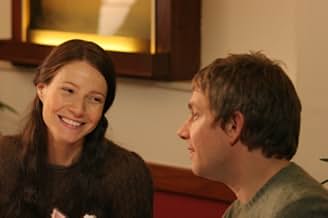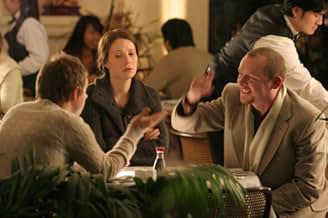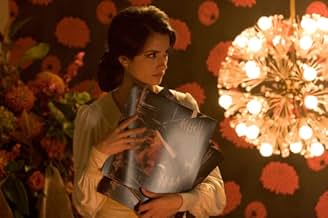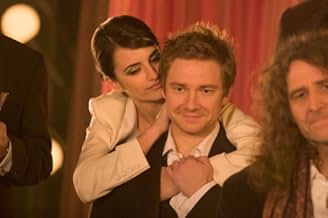IMDb-BEWERTUNG
5,7/10
8849
IHRE BEWERTUNG
Ein ehemaliger Popstar, der jetzt beruflich Werbejingles schreibt, erlebt eine Midlife-Crisis.Ein ehemaliger Popstar, der jetzt beruflich Werbejingles schreibt, erlebt eine Midlife-Crisis.Ein ehemaliger Popstar, der jetzt beruflich Werbejingles schreibt, erlebt eine Midlife-Crisis.
- Auszeichnungen
- 1 Nominierung insgesamt
Skye Bennett
- Ballerina
- (as a different name)
Empfohlene Bewertungen
It's pretty obvious that first-time director/screenwriter Jake Paltrow was heavily inspired by Michel Gondry's surreal, off-kilter work in "The Science of Sleep" and "Eternal Sunshine of the Spotless Mind" in making this downbeat 2007 dramedy. Barely in theaters before heading right to DVD, the film works on an intriguing (albeit unoriginal) premise but is then undermined by a muddy execution and unlikable characters despite some nice visuals. The plot concerns put-upon Gary, a TV commercial jingle writer who was once an '80's Britpop star. His professional life has become a drudge as he begrudgingly works with his best pal and former bandmate Paul, who has sold his soul to become a successful advertising executive. Meanwhile, life at home is no picnic since Gary has to suffer from the constant passive-aggressive derision of his frumpy, needling girlfriend Dora.
Into this emotional void, Gary starts to have vivid dreams of a beautiful fantasy woman named Anna, who turns out to have a basis in reality. It's no wonder that Gary seeks the counsel of a "lucid dreaming" expert from New Jersey named Mel who helps him find ways to elongate the dreams for fear of having them evaporate entirely. Once all this is all established, Paltrow lets the film flail around in a series of frustrating scenes that have Gary turning more and more into an emotional zombie. Moreover, the marked contrast between Dora and Anna comes across as overstated with the result being complete indifference toward both women. Paltrow also uses a framing device of documentary-like testimonials from colleagues in Gary's past, a technique that doesn't make sense until the abrupt ending. None of the principal actors are terribly remarkable here except Simon Pegg ("Shaun of the Dead", "Hot Fuzz") who brings a much-needed energetic brio to the comically unsavory role of Paul. His cutting scenes with Gary are the best the movie offers.
As Gary, Martin Freeman (BBC's "The Office", "Breaking and Entering") is likeably dweeby at first, though he doesn't make credible his past as a debauched rock star. Danny DeVito merely plays a plot device in his customary matter and not much more as Mel. No matter how gorgeous she is (and she truly is in this film), Penélope Cruz is given short shrift by the script, so much so that her character remains incoherent and incomplete. But ironically, a worse fate befalls the filmmaker's famous sister Gwyneth, who has been so deglamorized as Dora as to render her character nearly unsalvageable. Granted there are some funny, off-the-cuff bits like Dora reacting to Gary's maniacal installation of foam over the bedroom windows by asking if it comes in white or Gary inexplicably reading "The Idiot's Guide to Understanding Iraq" in bed, but there isn't enough such cleverness to sustain the film. At 93 minutes, it actually feels overlong. The 2008 DVD provides a rather inchoate commentary from Jake Paltrow that is not very insightful.
Into this emotional void, Gary starts to have vivid dreams of a beautiful fantasy woman named Anna, who turns out to have a basis in reality. It's no wonder that Gary seeks the counsel of a "lucid dreaming" expert from New Jersey named Mel who helps him find ways to elongate the dreams for fear of having them evaporate entirely. Once all this is all established, Paltrow lets the film flail around in a series of frustrating scenes that have Gary turning more and more into an emotional zombie. Moreover, the marked contrast between Dora and Anna comes across as overstated with the result being complete indifference toward both women. Paltrow also uses a framing device of documentary-like testimonials from colleagues in Gary's past, a technique that doesn't make sense until the abrupt ending. None of the principal actors are terribly remarkable here except Simon Pegg ("Shaun of the Dead", "Hot Fuzz") who brings a much-needed energetic brio to the comically unsavory role of Paul. His cutting scenes with Gary are the best the movie offers.
As Gary, Martin Freeman (BBC's "The Office", "Breaking and Entering") is likeably dweeby at first, though he doesn't make credible his past as a debauched rock star. Danny DeVito merely plays a plot device in his customary matter and not much more as Mel. No matter how gorgeous she is (and she truly is in this film), Penélope Cruz is given short shrift by the script, so much so that her character remains incoherent and incomplete. But ironically, a worse fate befalls the filmmaker's famous sister Gwyneth, who has been so deglamorized as Dora as to render her character nearly unsalvageable. Granted there are some funny, off-the-cuff bits like Dora reacting to Gary's maniacal installation of foam over the bedroom windows by asking if it comes in white or Gary inexplicably reading "The Idiot's Guide to Understanding Iraq" in bed, but there isn't enough such cleverness to sustain the film. At 93 minutes, it actually feels overlong. The 2008 DVD provides a rather inchoate commentary from Jake Paltrow that is not very insightful.
Making a movie about dreams or dreaming is tough, and it shows in this one. The difficulty with dreams in any bit of fiction is that they can't be held accountable; that is, by definition, there isn't any kind of direct correspondence between dream occurrences and narrative significance. A dream (singular) here and there can enrich a narrative with symbolism, causality, subconscious, but when the dream becomes plural then almost universally a story starts to break down. Having gritted my teeth through movies like Waking Life and The Cell, to name a few, I've come to associate "dream" with "lazy" in cinema.
That being said, I had to see what Simon Pegg and Martin Freeman would do in a movie together. And the bottom line is, due to these two guys, the movie is worth a watch. Don't may more than $4 to see it.
What you get really is a movie without consequences. You have Martin Freeman obsessed with a dream character. OK, kind of interesting, but there's not enough dimension to his girlfriend (Paltrow), who just seems like a nag, or his friend/former bandmate (Pegg), who, granted, is extremely funny but ultimately without Pathos, to really make his dream obsession a truly engrossing psychological/sociological study.
And again, what happens here is that the dream sequences, and even the obsession with them, because of the, by definition, incommensurable quality of dreams, their inability to be authentically expressed through proxy (language, film, journals, etc.), leave us as audience members bereft of any feeling of causality, arc, or direction.
Also, as a sidenote, the pseudo-documentary format that the film opens with and halfheartedly maintains is confusing and ultimately misdirecting. It ends up looking like the mistake of a novice director.
Martin Freeman performs his lines well, Pegg is funny, DeVito is a pleasing eccentric, and Paltrow isn't as annoying as she usually is (however Cruz is somewhat intolerable), so the movie is worth seeing once, if you've got nothing better to do.
That being said, I had to see what Simon Pegg and Martin Freeman would do in a movie together. And the bottom line is, due to these two guys, the movie is worth a watch. Don't may more than $4 to see it.
What you get really is a movie without consequences. You have Martin Freeman obsessed with a dream character. OK, kind of interesting, but there's not enough dimension to his girlfriend (Paltrow), who just seems like a nag, or his friend/former bandmate (Pegg), who, granted, is extremely funny but ultimately without Pathos, to really make his dream obsession a truly engrossing psychological/sociological study.
And again, what happens here is that the dream sequences, and even the obsession with them, because of the, by definition, incommensurable quality of dreams, their inability to be authentically expressed through proxy (language, film, journals, etc.), leave us as audience members bereft of any feeling of causality, arc, or direction.
Also, as a sidenote, the pseudo-documentary format that the film opens with and halfheartedly maintains is confusing and ultimately misdirecting. It ends up looking like the mistake of a novice director.
Martin Freeman performs his lines well, Pegg is funny, DeVito is a pleasing eccentric, and Paltrow isn't as annoying as she usually is (however Cruz is somewhat intolerable), so the movie is worth seeing once, if you've got nothing better to do.
Being a fan of Gwyneth Paltrow and Penelope Cruz, seeing the neat looking poster, and having an interest in the exploration of dreams in films, I decided to give The Good Night a try. Little did I know the nightmare that would become the next hour of my life. The Good Night has an inadequate exposition; it's a poorly introduced and explained film that flatlines for the first hour. If The Good Night would've supplied the theaters showing it with sleeping masks like 3D movies handing out glasses, it would've been a more enjoyable night out.
I love watching films about our dreams. When filmmakers make us think about our subconscious when we rest and the truths we realize about ourselves are extremely interesting to me. The only truth Martin Freeman learns about his dreams until the third act is how much he wants to have sex with Penelope Cruz. The storyline of the film doesn't warrant the film's existence. The Good Night tries to comment on a mid-life crisis, but inaccurately musters up a conventional, musty representation of one.
The simple thoughts the filmmakers built the film on could've been the starting point of intriguing ideas, but instead feel like they were tomatoes, cut in half, placed on hot pavement, under the sun on the hottest day of the year. Every idea is dried up and are roasted by the lack of effort. The first hour contains some really awful dialogue on top of the lack of development behind the plot. The person who designed Gwyneth Paltrow's character's look should've been fired, her unflattering hair is the thing I focused on most of her screen time due to lack of interest in The Good Night's third-rate production.
A thought that I literally squealed out of my mouth during The Good Night was "How did this script and director attract this cast?" The cast is not as ghastly as the rest of the film. Gwyneth Paltrow actually delivers a few great scenes throughout and the film finally begins to wake up when Penelope Cruz's character is not just a figment of the imagination anymore, Cruz is much to thank for the film's kick in the ass to at least shift out of reverse. The one upside of the script is the occasional sincere quotes about life. The Good Night does begin to look up in the last half hour. It finally starts to dig deeper into the Paltrow-Freeman relationship, I began to feel this trip wasn't completely waste of my time.
When I was watching The Good Night I had no clue who the director was that I was throwing insults at in my head. After finishing, I was informed it was none other than Gwyneth Paltrow's brother, Jake Paltrow. When the talent was being divvied up in the family, it's clear Jake wasn't given the fair amount. The Good Night is poorly made and dreadfully thought up, though the film's last act begins to rectify the harm of the first hour, there's no salvaging the departed film. The bottom line is, The Good Night shouldn't have been telling us how to have a mid-life crisis, it should've been living one. It's unmistakably obvious The Good Night isn't even as deep as the paper in which its script has been typed on.
Rating: 4
Grade: C-
I love watching films about our dreams. When filmmakers make us think about our subconscious when we rest and the truths we realize about ourselves are extremely interesting to me. The only truth Martin Freeman learns about his dreams until the third act is how much he wants to have sex with Penelope Cruz. The storyline of the film doesn't warrant the film's existence. The Good Night tries to comment on a mid-life crisis, but inaccurately musters up a conventional, musty representation of one.
The simple thoughts the filmmakers built the film on could've been the starting point of intriguing ideas, but instead feel like they were tomatoes, cut in half, placed on hot pavement, under the sun on the hottest day of the year. Every idea is dried up and are roasted by the lack of effort. The first hour contains some really awful dialogue on top of the lack of development behind the plot. The person who designed Gwyneth Paltrow's character's look should've been fired, her unflattering hair is the thing I focused on most of her screen time due to lack of interest in The Good Night's third-rate production.
A thought that I literally squealed out of my mouth during The Good Night was "How did this script and director attract this cast?" The cast is not as ghastly as the rest of the film. Gwyneth Paltrow actually delivers a few great scenes throughout and the film finally begins to wake up when Penelope Cruz's character is not just a figment of the imagination anymore, Cruz is much to thank for the film's kick in the ass to at least shift out of reverse. The one upside of the script is the occasional sincere quotes about life. The Good Night does begin to look up in the last half hour. It finally starts to dig deeper into the Paltrow-Freeman relationship, I began to feel this trip wasn't completely waste of my time.
When I was watching The Good Night I had no clue who the director was that I was throwing insults at in my head. After finishing, I was informed it was none other than Gwyneth Paltrow's brother, Jake Paltrow. When the talent was being divvied up in the family, it's clear Jake wasn't given the fair amount. The Good Night is poorly made and dreadfully thought up, though the film's last act begins to rectify the harm of the first hour, there's no salvaging the departed film. The bottom line is, The Good Night shouldn't have been telling us how to have a mid-life crisis, it should've been living one. It's unmistakably obvious The Good Night isn't even as deep as the paper in which its script has been typed on.
Rating: 4
Grade: C-
If indie dramas are to believed, there are essentially two reasons why there is so much unhappiness in the world (at least among the more privileged classes who have the time and resources to think of such things): a) people can't stand the idea of being alone in the world, yet they also can't stand the idea of being with another person for long stretches of time either, and b) it's hard to come to terms with the contrast between what we imagined our life would be like and what it actually turned out to be.
A case in point is "The Good Night," a mid-life-crisis drama with a surrealistic twist. Gary is a songwriter/musician who used to be part of a band but who has now been reduced to writing commercial jingles and scores for second-rate TV shows. A somewhat de-glamorized Gwyneth Paltrow plays Gary's nagging long-time girlfriend who's definitely become disenchanted with their relationship, while the ultra-glamorous Penelope Cruz stars as the literal woman of his dreams – until she materializes and becomes a part of his waking world that is. In fact, a fairly large chunk of the movie's running time is taken up with Gary's dreams, which inevitably feature this alluring figure who stands in obvious counterpoint to Dora's flesh-and-blood imperfections. And then there's Danny De Vito as the scene-stealing New Age dream-whisperer who attempts to maneuver Gary through his crisis.
The point of the film, written and directed by Jake Paltrow (brother of Gwyneth), seems to be that ideal worlds and ideal relationships exist only in dreams, and that, if you want to survive and maybe even find a little bit of happiness in this life, you had better start accepting some compromises and limitations and not, as Voltaire once opined, make the perfect the enemy of the good. Even Gary's dream-woman is eventually unmasked as a relatively pedestrian fashion model who definitely does not live up to the dreams and fantasies Gary has about her before he meets her in the actual flesh.
The movie does a nice job transitioning back and forth between the world of reality and the world of dreams, and the actors demonstrate an astute understanding of the roles they are playing. Some of the conversations and arguments the lovers engage in are almost too painfully realistic at times, with Dora, in particular, unloading her feelings on Gary to withering effect.
It's not exactly a world-shaking human drama, but it offers some insightful observations into those maddeningly messy things we euphemistically call "romantic relationships."
A case in point is "The Good Night," a mid-life-crisis drama with a surrealistic twist. Gary is a songwriter/musician who used to be part of a band but who has now been reduced to writing commercial jingles and scores for second-rate TV shows. A somewhat de-glamorized Gwyneth Paltrow plays Gary's nagging long-time girlfriend who's definitely become disenchanted with their relationship, while the ultra-glamorous Penelope Cruz stars as the literal woman of his dreams – until she materializes and becomes a part of his waking world that is. In fact, a fairly large chunk of the movie's running time is taken up with Gary's dreams, which inevitably feature this alluring figure who stands in obvious counterpoint to Dora's flesh-and-blood imperfections. And then there's Danny De Vito as the scene-stealing New Age dream-whisperer who attempts to maneuver Gary through his crisis.
The point of the film, written and directed by Jake Paltrow (brother of Gwyneth), seems to be that ideal worlds and ideal relationships exist only in dreams, and that, if you want to survive and maybe even find a little bit of happiness in this life, you had better start accepting some compromises and limitations and not, as Voltaire once opined, make the perfect the enemy of the good. Even Gary's dream-woman is eventually unmasked as a relatively pedestrian fashion model who definitely does not live up to the dreams and fantasies Gary has about her before he meets her in the actual flesh.
The movie does a nice job transitioning back and forth between the world of reality and the world of dreams, and the actors demonstrate an astute understanding of the roles they are playing. Some of the conversations and arguments the lovers engage in are almost too painfully realistic at times, with Dora, in particular, unloading her feelings on Gary to withering effect.
It's not exactly a world-shaking human drama, but it offers some insightful observations into those maddeningly messy things we euphemistically call "romantic relationships."
The Good Night (2007)
Gwyneth's brother directs a curious but strained movie featuring both Gwyneth Paltrow as the real world lead and Penelope Cruz as some kind of vixen of the lead men's dreams. Now you might wonder what leading man Martin Freeman has wrong with him that he gets to sleep with his wife, played by Gwyneth, and yet he dreams of this other, Latina, woman. This is so filled with simplistic male fantasy, with stereotypes of ethnic types and gender roles, it's sometimes painful.
Most of the time you can, hopefully, gloss over this and see pure cleverness (in the footsteps of The Science of Sleep 2006) and layers of reality (a pale version of any Kaufman film like Eternal Sunshine (2004) or the more recent Synecdoche, New York). In fact, you might see the use of the woman's face in advertising as an echo of Red (1994). I guess I'm struggling to find the originality here, which I'm sure is meant to hold it all together.
Martin Freeman is likable but a little milquetoast for me, as the locus of the whole movie. Cruz is a relief in leather (the white fur on the beach scenes are total gag me clichés, even as clichéd dreams). I rather like Paltrow the sister as an actress when she is the normal young woman, which she is, but it does force the script to rise up and make their normal coupleness vivid, or trenchant, or comic. It is only slightly two of these. The fourth main character in spurts, besides the caricature that is Danny DeVito, is Simon Pegg (Shaun of the Dead fame), who is really a great presence, stealing his scenes.
Do I say see this movie? Only if there are some aspects here, and some influences, that are up your alley. It's not horrible at all, a kind of back-handed something to say without just saying it tries too hard.
Gwyneth's brother directs a curious but strained movie featuring both Gwyneth Paltrow as the real world lead and Penelope Cruz as some kind of vixen of the lead men's dreams. Now you might wonder what leading man Martin Freeman has wrong with him that he gets to sleep with his wife, played by Gwyneth, and yet he dreams of this other, Latina, woman. This is so filled with simplistic male fantasy, with stereotypes of ethnic types and gender roles, it's sometimes painful.
Most of the time you can, hopefully, gloss over this and see pure cleverness (in the footsteps of The Science of Sleep 2006) and layers of reality (a pale version of any Kaufman film like Eternal Sunshine (2004) or the more recent Synecdoche, New York). In fact, you might see the use of the woman's face in advertising as an echo of Red (1994). I guess I'm struggling to find the originality here, which I'm sure is meant to hold it all together.
Martin Freeman is likable but a little milquetoast for me, as the locus of the whole movie. Cruz is a relief in leather (the white fur on the beach scenes are total gag me clichés, even as clichéd dreams). I rather like Paltrow the sister as an actress when she is the normal young woman, which she is, but it does force the script to rise up and make their normal coupleness vivid, or trenchant, or comic. It is only slightly two of these. The fourth main character in spurts, besides the caricature that is Danny DeVito, is Simon Pegg (Shaun of the Dead fame), who is really a great presence, stealing his scenes.
Do I say see this movie? Only if there are some aspects here, and some influences, that are up your alley. It's not horrible at all, a kind of back-handed something to say without just saying it tries too hard.
Wusstest du schon
- WissenswertesWhen they're in the new age bookstore, Paul (Simon Pegg) says to Gary (Martin Freeman), "What are we doing in the hobbit hole?" Freeman played Bilbo Baggins in The Hobbit trilogy.
- Zitate
Mel: Sometimes I wish that you could just hit the sack and never wake up. If your favorite song never ended, or your best book never closed, if the emotions mustered from these things would just go on and on, who wouldn't want to stay asleep? The guy who discovers that perpetual dream, he's my man.
- SoundtracksThe Universal
Written by Damon Albarn, Graham Coxon, Alex James (as Steven Alexander James) & Dave Rowntree
Performed by The Royal Philharmonic Orchestra
Courtesy of N2K Publishing Ltd.
Top-Auswahl
Melde dich zum Bewerten an und greife auf die Watchlist für personalisierte Empfehlungen zu.
- How long is The Good Night?Powered by Alexa
Details
- Erscheinungsdatum
- Herkunftsländer
- Offizieller Standort
- Sprachen
- Auch bekannt als
- The good Night - Träum weiter...
- Drehorte
- Produktionsfirmen
- Weitere beteiligte Unternehmen bei IMDbPro anzeigen
Box Office
- Budget
- 15.000.000 $ (geschätzt)
- Bruttoertrag in den USA und Kanada
- 22.441 $
- Eröffnungswochenende in den USA und in Kanada
- 12.377 $
- 7. Okt. 2007
- Weltweiter Bruttoertrag
- 508.084 $
- Laufzeit1 Stunde 33 Minuten
- Farbe
- Sound-Mix
- Seitenverhältnis
- 1.85 : 1
Zu dieser Seite beitragen
Bearbeitung vorschlagen oder fehlenden Inhalt hinzufügen



































